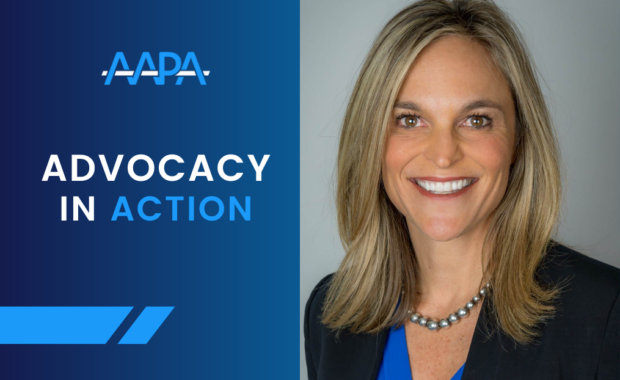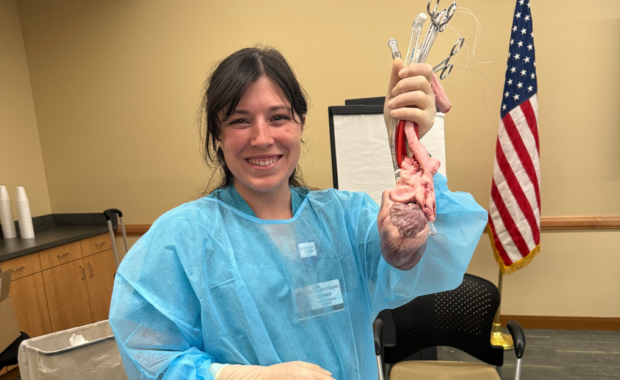AAPA Comments on the Proposed 2024 Medicare Physician Fee Schedule
AAPA Reimbursement Team
The American Academy of PAs (AAPA) submitted comments to the Centers for Medicare and Medicaid Services (CMS), the federal agency that oversees the Medicare program, in response to the 2024 Physician Fee Schedule (PFS) proposed rule. The rule recommends numerous changes to Medicare’s coverage and payment policies that impact PAs, physicians and other health professionals. The proposed provisions that CMS elects to finalize will take effect on January 1, 2024. In addition to interacting with CMS officials throughout the year, the annual proposed PFS is an opportunity for AAPA to advocate for PA-positive policies in the Medicare program.
Below are some of the topics on which AAPA provided comment:
Split/Shared Visit Billing
Split (or shared) visit billing occurs when a PA or nurse practitioner (NP) and a physician provide care to the same patient on the same calendar day in the hospital setting. CMS establishes certain guidelines to determine when that combined care can be billed under the name of the physician and when it must be billed under the name of the PA or NP. In a previous regulatory proposal, CMS indicated an interest in determining who would be the billing provider (that is who performed the” substantive portion” of care) based upon which health professional spent the most amount of time with the patient. AAPA is against only allowing for a “time-based” determination because the idea of each health professional keeping track of how much time was spent with each patient would be administratively burdensome and fraught with fraud concerns.
The current rules for split/shared billing allow for either which health professional spends the most time with the patient or will allow the physician to bill the service if the physician performs a complete component of either history, physical exam, or medical decision-making (MDM). The agency agreed and has proposed that the current definition of “substantive portion” under split (or shared) visit billing remain unchanged in 2024. AAPA approves of this proposal and requested that CMS make the current definition of substantive portion permanent. AAPA further requested the name and NPI of the PA or NP participating in a split (or shared) visit be included on the claim even if the service is billed under the physician’s name. This will provide enhanced transparency about the increasingly important role PA and NPs play in delivering medical care.
Cardiac and Pulmonary Rehabilitation Authorization
CMS plans to implement regulations to expand the health professionals who may supervise pulmonary rehabilitation (PR), cardiac rehabilitation (CR) and intensive cardiac rehabilitation (ICR) to include PAs, nurse practitioners and clinical nurse specialists. Achieving this authorization was the result of advocacy efforts by AAPA and other groups which led to the passage of federal legislation. AAPA fully supports the implementation of this authorization but also requested that CMS 1) remove certain physician-centric regulatory language in other parts of the current guidelines, and 2) work with Congress to authorize PAs to specifically order (not just supervise) CR, ICR, and PR.
[Stay up to date on legislative information that impacts you – join or renew today]
Accountable Care Organization (ACO) Assignment
ACO assignment is the process in which a patient is determined to be an eligible member of an ACO. One method of ACO assignment requires that the patient have at least one visit with an ACO primary care physician within a 12-month period. CMS proposes to create an additional process under the ACO assignment process in hopes of capturing additional beneficiaries that may not have been identified for ACO inclusion. Specifically, CMS proposes to expand the ability of patients to be assigned if they received all of their care in the previous year from a non-MD/DO health professional, such as a PA. While statutory requirements remain for a beneficiary to have seen a physician to trigger assignment to an ACO, CMS proposed to implement an “expanded window” starting in 2025 that would allow for a beneficiary to be assigned to an ACO if they saw a physician within the past 24 months, and a PA within the past 12 months. AAPA approves of the proposed new process but urged the agency to work with Congress to go further by removing the statutory requirement for a Medicare beneficiary to be treated by a physician at any point in order to achieve ACO assignment.
Additional Areas of Interest
The topics mentioned above are three of the nearly 30 issues AAPA commented on in the proposed rule. Other issues included AAPA:
- Opposing the proposed overall 1.25% fee schedule payment rate reduction and the 34% decrease in the 2024 Medicare conversion factor.
- Advocating for the continuation of numerous telehealth flexibilities such as permanently allowing patients to receive telemedicine services while in their homes.
- Agreeing with the implementation of add-on code G2211 which would provide additional payment in recognition of the resource costs associated with outpatient evaluation and management visits for primary care and longitudinal care of complex patients.
- Supporting the extension of payment for telehealth services furnished in rural health clinics (RHCs) and federally qualified health centers (FQHCs) through December 31, 2024, and delaying the in-person requirements under Medicare for mental health visits furnished in RHCs and FQHCs.
If you have questions about AAPA’s comment or any other reimbursement concerns contact AAPA’s Reimbursement Team at [email protected].
You May Also Like
PA Licensure Compact Bill Passes in Delaware
Oregon Governor Signs Bill Expanding PA Representation on State Medical Board
Florida Governor Signs Bill to Remove PA Educational and Licensure Barriers into Law
Thank you for reading AAPA’s News Central
You have 2 articles left this month. Create a free account to read more stories, or become a member for more access to exclusive benefits! Already have an account? Log in.




